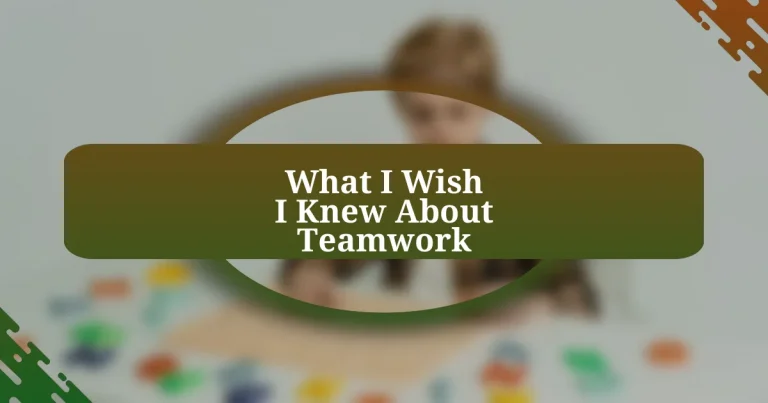Key takeaways:
- Teamwork in cricket fosters trust and camaraderie, leading to resilience during challenging moments.
- Engaging in teamwork helps children develop crucial life skills like communication, cooperation, and problem-solving.
- Collective motivation and shared responsibility enhance overall performance, often turning setbacks into opportunities for success.
- Facing challenges together strengthens relationships, emphasizing the importance of support and unity among teammates.
Understanding teamwork in cricket
Understanding teamwork in cricket goes beyond just playing together; it’s about building trust and camaraderie. I remember a local match where our team was down by a lot, but instead of giving up, we rallied together. That moment of unity really showed me how crucial teamwork is; it lifts spirits and often leads to surprising comebacks.
In cricket, every player has a unique role, and it’s fascinating to see how those roles intertwine. Have you ever noticed how a bowler relies on fielders to catch those tricky balls? When I played, I distinctly felt the pressure when I bowled, knowing my teammates were right there to back me up. That connection creates a supportive environment that can influence the outcome of the game.
The emotional ups and downs in a cricket match can test teamwork to its limits. For example, during a tense final, we lost a key wicket, and I could see the despondency on my teammates’ faces. But it was amazing to watch how we encouraged one another, reminding each other of our strengths. That shared pride and resilience can turn even an individual setback into a collective motivation to succeed.
Importance of teamwork for kids
Teamwork is essential for kids as it nurtures essential life skills like communication and cooperation. I recall a time when our team was practicing a new strategy. Standing together, we shared ideas and listened to each other, which not only improved our game but also strengthened our friendships. Isn’t it amazing how a single conversation can transform a group of kids into a cohesive unit?
When kids engage in teamwork, they learn to appreciate different perspectives. I vividly remember a match where our bowler had a unique approach that I initially doubted. However, when it worked brilliantly, I realized that everyone’s contribution matters. This kind of experience teaches children the value of diversity in thinking, helping them understand that each player brings something special to the table.
Moreover, overcoming challenges together can build resilience in kids. I once played in a tournament where we faced a tough opponent. Instead of panicking, we rallied together, encouraging one another even when the odds seemed stacked against us. It was a moment that reminded me how working through challenges as a team not only boosts confidence but also deepens bonds among teammates. What challenges have you or your kids faced in teamwork, and how did that experience shape your understanding of support and perseverance?
Key skills developed through teamwork
When kids work together, they develop strong communication skills. I remember during one practice session, our coach emphasized the importance of calling out play strategies clearly. I saw how even the shyest members of our team began to speak up, leading to better coordination on the field. This experience was a reminder that clear communication is not just about talking; it’s about ensuring everyone understands and feels included.
Collaboration in a team setting also hones problem-solving abilities. There was a match where we found ourselves in a pickle, with the opposing team scoring heavily. Instead of freezing in fear, we gathered for a quick huddle. As we strategized and bounced ideas off one another, I realized how much creative solutions can emerge from open dialogue. Have you ever witnessed a team turn an overwhelming situation into an opportunity for innovation?
Finally, teamwork instills a sense of accountability among young players. I think back to a day when a teammate missed a critical catch, and instead of pointing fingers, we all supported her. We took it as a collective responsibility to do better. This moment highlighted that every team member plays a vital role, and when children learn to own their actions and support each other, they not only grow individually but also strengthen the whole team dynamic. How does fostering accountability among kids enhance their engagement in both cricket and life?
How teamwork improves performance
Teamwork acts as a catalyst for enhancing performance. I’ll never forget a particular tournament where our team’s synergy truly shone through. Each player’s unique strengths came together harmoniously, creating a collective force that made us more formidable on the field. It was in those moments of unity that we played our best cricket, often surprising our opponents with unexpected plays.
Another aspect of teamwork that significantly boosts performance is the increased motivation that arises from working together. During a challenging match, I vividly recall how one teammate, struggling with his confidence, was lifted by our encouragement. We rallied around him, cheering him on, and his subsequent performance turned the tide of the game. Isn’t it fascinating how uplifting one another can lead to individual breakthroughs that benefit the entire team?
Moreover, the shared responsibility inherent in teamwork is a powerful motivator. I once played alongside a passionate group of kids who wanted nothing more than to win for each other. Every time we executed a play successfully, the joy we felt was infectious. This shared experience not only improved our performance but also deepened our bonds, illustrating that when everyone contributes to a common goal, the results can be extraordinary. How often do you think teams achieve greatness by lifting each other up?
Personal experiences with cricket teamwork
There was this one match that remains vivid in my memory. We were facing a rival team that had beaten us before, and the pressure was palpable. But I remember how we gathered in a huddle before the game, each of us sharing our thoughts, strategies, and personal goals. That unity fueled our determination, and when we stepped onto the field, I could sense that we were more than just a team; we were a family fighting together for a common purpose.
In another instance, we were losing a game and tensions were running high. I noticed how my teammate’s spirit began to dim as his batting performance faltered. Instead of pointing fingers, we rallied around him, sharing tips and reminding him of all the times he had succeeded. That moment was so powerful—seeing how quickly encouragement changed not just his mindset but also our entire morale. Isn’t it incredible how a few words of support can turn an individual’s doubt into collective strength?
Looking back, I’ve realized that every victory and defeat on the cricket field has taught me the importance of trust and collaboration. After one hard-fought season, we gathered for a post-match reflection, sharing our experiences, ups, and downs. The emotions in that circle were raw and real, and it dawned on me then just how much we had grown together—both as players and friends. How often do we find joy in not just winning but in the journey we take together?
Lessons learned from team challenges
In one challenging tournament, we faced a team that seemed unbeatable. As the matches progressed, our failures began to weigh heavily on our spirits. But, rather than getting discouraged, we started to invite constructive feedback during our training sessions. This lesson highlighted how open communication can transform a team’s dynamics. Isn’t it fascinating how adversity can nurture resilience and growth?
During another tough match, we found ourselves down by a significant margin and the frustration within our ranks started to boil over. In that moment of disarray, I recalled a wise coach once saying, “You rise to the occasion by lifting each other.” We took a timeout, regrouped, and refocused, which allowed us to channel our energy positively. That experience reminded me of the beauty of teamwork: sharing not only the highs but also shouldering the lows together. Why does it feel so liberating to lean on your teammates when things get tough?
I remember a particular season where we faced constant setbacks. Each defeat felt like a step back, but it also brought us closer. In our weekly meetings, we would discuss what went wrong and how we could support one another moving forward. By the end of that season, the friendships forged through challenges had become the backbone of our team. Isn’t it incredible how the toughest moments often bring the sweetest rewards in building lasting relationships?


